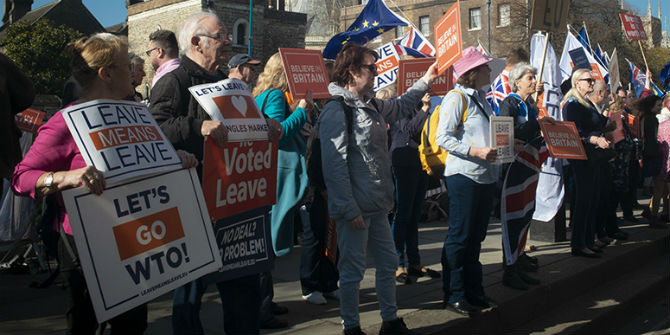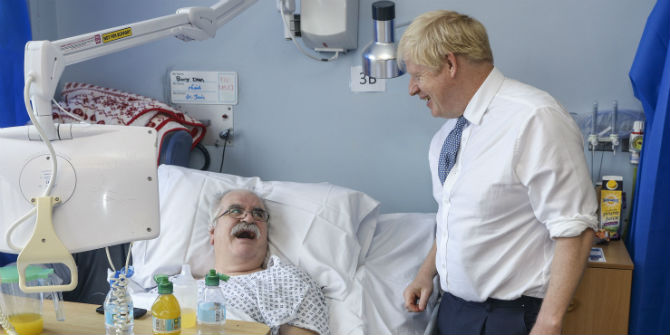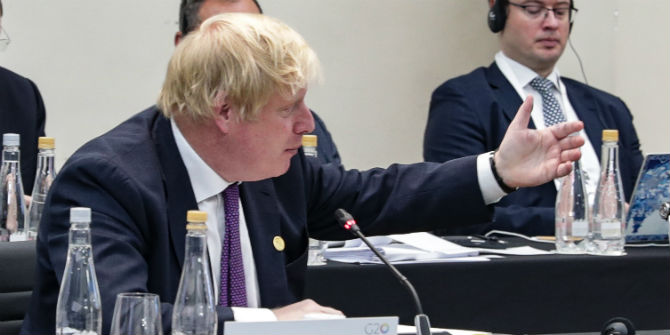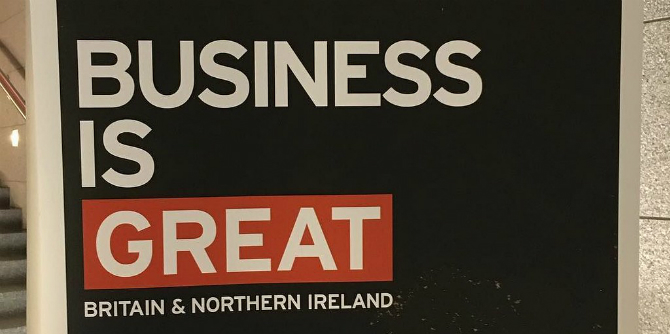 Many Brexiteers see the WTO as a desirable framework for the UK’s trade. Donald Trump dislikes it. Steven Woolcock (LSE) explains how the WTO has been undermined by outdated rules, US trade policy and China’s support for its own industries. It looks like rather a poor alternative to negotiating agreements with major markets.
Many Brexiteers see the WTO as a desirable framework for the UK’s trade. Donald Trump dislikes it. Steven Woolcock (LSE) explains how the WTO has been undermined by outdated rules, US trade policy and China’s support for its own industries. It looks like rather a poor alternative to negotiating agreements with major markets.
Two developments are seen as evidence of the rise of populist opposition to the established liberal order: Brexit and Donald Trump. While similar in many respects, they have very different views on the World Trade Organisation. Brexiteers see the WTO as an acceptable – if not preferable – alternative to an agreement with the EU, and presumably a suitable framework for the UK as a global trader. President Trump sees WTO rules as a constraint on US trade policy, too weak or no longer compatible with US national interests. So are WTO rules the key to prosperity – or not fit for purpose?

The purpose of WTO rules, as they have evolved from the establishment of the General Agreement on Tariffs and Trade (GATT) in 1948 to the World Trade Organisation in 1995, has been to:
a) provide a stable framework for increased trade and prosperity;
b) promote a broad balance of benefits across all participating economies;
c) ensure non-discrimination (in the shape of the most favoured nation provision in Article I of the GATT and national treatment for like products in Art III;
d) to limit distortions due to discretionary intervention by states; and finally
e) to provide for an impartial resolution of disputes.
Above all, the WTO is a predominantly rules-based trading system based on consensus and cooperation, as opposed to a power-based system in which the unilateral use of market power alone determines outcomes.
Today the reality is that the WTO does not rule – and the whole multilateral trading system is in a state of crisis, for the following reasons.
WTO rules are sadly outdated. Most of the existing WTO rules date from 1995 when the organisation was established. This was before global value chains became a feature of international trade, before the extensive application of the internet to trade and investment, before China emerged as a trading power to match the US and the EU and before the need to reconcile trade liberalisation with other policy objectives, such as tackling climate change, was widely recognised and accepted. Efforts to update the multilateral rules in the shape of the so-called Doha Development Agenda negotiations launched in 2001 have largely failed. This is the first time such a multilateral round of trade negotiations has failed since 1948.
Today PTA (Preferential Trade Agreement) rules shape the global economy more than WTO rules. As the WTO has failed to keep pace with the degree of integration in the world economy that has occurred in the past quarter of a century, governments have negotiated PTAs to help fill the vacuum. This effort to negotiate PTAs has then undermined the value of the WTO for many countries. PTAs, at least between more developed economies such as the UK and the US, enable a wider range of trade costs and barriers to be addressed quicker than the WTO with its 164 members. The results have been that tariffs within the PTAs are generally fully liberalised, except for a few sensitive sectors that account of 2-3% of all tariff lines. The commitments on services are much more extensive than under the General Agreement on Trade in Services (GATS) that forms part of the WTO rules.
PTAs also include investment, trade facilitation (measures to reduce the costs of customs and border controls) and importantly address differences in regulatory norms or standards, which with the removal of tariffs now constitute the most important cost of doing business internationally. PTAs have also begun to address the sustainability of trade and investment and how trade rules need to be modernised and rebalanced to match wider social and environmental policy preferences.
The WTO is now in crisis. After languishing for some years and being overtaken by PTAs, the WTO now finds itself in probably the most profound crisis since 1948. This has been precipitated by current US trade policy. The Trump administration has reverted to a more power-based approach to trade. This takes the form of threatening and/or actually closing the US market as a means of forcing its trading partners to make concessions. These actions are justified by the use of US national trade legislation, such as Section 301 of the 1974 Trade Act, or by the spurious claim that imports are threatening US national security, under Section 232 of the US Trade Expansion Act of 1962.
With this unilateral action the US is effectively bypassing WTO rules. In claiming national security as grounds for increasing tariffs it threatens the whole trading system. If the US can do this other countries will feel they can also have a free hand to take protectionist measures. But the main point here is that the US no longer sees the WTO as serving US interests, because it is seen as favouring others more than the US and thus failing to ensure a broad balance of benefits.
As the current WTO rules constrain the US from discriminating against countries that have a trade surplus with the US, the Trump administration has resorted to any measure that enables the use of discretion, hence the use of national security to justify tariffs. The Trump administration, as did the previous Obama administration, is also blocking the appointment of members of the Appellate Body of the WTO on a number of grounds, but primarily because the US is no longer willing to accept rulings in Geneva limiting its sovereignty and thus its ability to act. Blocking appointments to the Appellate Body of the WTO will soon render the dispute settlement function of the WTO ineffective.
The other more slow burning challenge to WTO rules is China’s support for its domestic industries. Many countries have provided support for industry, especially in the early stages of development and industrialisation. But none have done so on the scale of current Chinese policy. The existing WTO rules preventing major distortions from national subsidies, the operation of state-owned enterprises or the (absence) of pro-competition policies are not capable to dealing with the scale of Chinese support. China argues it remains a key supporter of the WTO rules-based, multilateral trading system, but in this it appears to mean the current WTO rules, which, as noted above, date from 1995 and do not seriously constrain China’s strategic trade policy. The US action against China outside of the WTO rules is of course a reflection of the weakness of the WTO rules in this respect. But by acting unilaterally rather than seeking a more cooperative solution the US is threatening the fabric of the rules-based trading system.
What can we conclude from the above? Rather than offering an opportunity for Britain to pursue a new role as a global trader, the WTO looks like a rather poor alternative to the negotiation of agreements with major markets. In this the priorities run: first the EU; then all the countries to which the UK has preferential access under the existing EU PTAs; and then perhaps – in the rather distant future, given the difficulty in negotiating such agreements – the US, India etc. The central role of PTAs means that UK exporters and investors will be at a clear disadvantage until the UK government can renegotiate agreements with countries with which it had preferential agreements as a member of the EU. None of this is possible until the UK has settled its trading relationship with the EU.
Beyond this, the UK’s long-term interests must be in preserving an open rules-based trading system. Only the ‘big beasts’ of the US and China can defend their national interests in a power-based order. In pursuing this aim the UK’s interests – as a leading member of a group of WTO members seeking to defend multilateralism – will be closely aligned with those of the EU, as well as other developed and developing economies.
This post represents the views of the author and not those of the Brexit blog, nor LSE.







This is a valuable insight into some of the realities which fly in the face of the growing number of otherwise seemingly intelligent politicians who talk glibly about “leaving on WTO terms”. But its worse than that.
The gradual grooming of a large section of the population from the initial “easiest ever deal to negotiate” and “we can have our cake and eat it” to “let’s just walk away and trade under WTO terms” has been fascinating and deeply worrying. If any form of brexit proceeds, the question of the precise terms of trade with the EU will only then be negotiated and it will take years. What “no deal” means is leaving with no withdrawal agreement (meaning immediate confusion as to the legal basis for all existing trade between the UK and EU), no transitional period to allow business to adjust and imposition of immediate tariffs on imported and exported goods – many substantial and disrupting to UK/EU trade let alone crippling to poorer people. Emergency measures to deal with checks at borders. maintain air travel and many other issues would be necessary. Given that “no deal” advocates are saying the £39bn divorce payment initially agreed by the British Government would not be made ( meaning for example that the other 27 countries would be expected to pay the hefty pensions to which Nigel Farage and many others are entitled for the rest of their lives) there would be enormous legal actions to defend and the chances of any goodwill leading to a beneficial free trade deal with the EU would be vanishingly small. The UK – already shredding its reputation for political competence – would risk being regarded as an international pariah.
If someone reading this can reassure me that my assessment of the so-called “clean brexit without a deal” is mistaken please do so. To me the only way to obtain a clean and rapid end to the current mess is to stop the brexit process altogether. The only way to achieve that democratically is to ask us – the electorate – to judge what we now want to do in the light of all we have learned in these three traumatic years.
The “pariah” stuff is certainly overblown: we wouldn’t be reneging on anything, we would be paying only our legal obligations rather than the extra “goodwill” payments May had offered to sweeten an overall deal. Like a group going out for dinner, if I suddenly get called away after we’ve only eaten the starter: I might offer to pay for all three courses if I want to curry favour with my dining companions – but if they get awkward or greedy about other aspects, I can just walk away paying only for my starter and let the others pay for their own.
If a net recipient of EU funds were leaving, would the EU offer to pay up planned funding even after they leave, despite there being no legal obligation to do so, or would they say that when you leave the payments stop?
Excellent post.
If the UK outside the EU and the EU27 behave like grown-ups, it should be possible for them to reach an acceptable trade deal. If the EU27 were to behave like a child with a tantrum and throw all the toys against the wall if the UK doesn’t wants to leave without granting the EU27 rights over Northern Ireland in perpetuity, that is surely all the more reason for walking away. Fortunately I think reason will, sometime, prevail. I think the EU27 have painted themselves into a corner and when the UK has finally left, they will be reasonable.
I note James Sutherland’s rather odd analogy of an interrupted dinner party but he is wrong to say “we wouldn’t be reneging on anything”. Every advocate of “no deal” I have seen up to now is alleging that the entire £39bn would be retained. Mr Sutherland is in effect assuming a renegotiation – not “no deal”. In any case the issue of the divorce payment is only one part of the immense problem that “no deal” would unleash.
Alias is falling back on the rather threadbare expectation that the 27 would crumble when exposed to a hearty dose of British grit. Surely by now it must be clear that this is not going to happen. The unanimity and consistency of the 27 throughout the last 3 years has been impressive. Forget about politicians. Listen to businessmen running major pan-european companies. Only recently I have heard the Chief Executive of such a company spelling out that the integrity of the single market and customs union is much more important to them than the undoubted difficulties that the UK walking away from the EU would cause. He said no-one should be in any doubt about this.
“Alias is falling back on the rather threadbare expectation that the 27 would crumble when exposed to a hearty dose of British grit.” No, it’s not that I think “the British, the British, the British are the best”, it is that I assume that, once the UK is finally out of the EU, people will behave like grown-ups. Of course the EU would be within its rights to put armed guards and fences on the NI border and make everyone’s lives difficult for no reason at all, but I don’t think they will.
Imagine a world where the UK had never belonged to the EU. Would we still have trade across the NI border? Would we still be friends? I certainly hope so.
The obvious parallel is with the border between the USA and Canada. This is, I admit, the only border I can think of between two developed countries which are not part of a customs union or single market. It is a hard border and it is inconvenient for people who want to commute between the two countries. Nevertheless it is not so inconvenient that Canadians want to join the United States. Nobody accuses the Canadians of being xenophobes if they say that, with all due respect to the USA, they would rather stay as they are.
I was not entitled to vote in the 2016 referendum but if I had been I think I would have voted Remain. I think there will certainly be a price to be paid for the UK “taking back control”, in the sense of being able to conclude its own customs agreements. Nevertheless I don’t think we should assume that being outside the EU will be the end of the world.
@Alias. As it happens I am an Ulsterman and I agree that some way would be found not to fortify the Irish border but it is no use picking out specific points where the worst may not happen. The overall effect of “No deal” would be very seriously damaging. Even though some sort of arrangement would have to eventually emerge the UK would be in a much weaker bargaining position. To me one of the silliest assertions from the brexiteers is that we would be in a stronger bargaining position having left. This really is Flanders and Swann stuff.
Thank you for your reply. As you are an Ulsterman your perspective is especially valuable. I must admit I have never visited the island of Ireland, North or South. I certainly wish the interests of the Northern Irish had been taken more into consideration by the rest of the UK during the referendum campaign; I think they, along with the people of Gibraltar, are likely to suffer most from Brexit.
I agree with you that if the UK wants to shape the future of the EU, it would have done better to vote to Remain. But I think the whole discussion of “who is stronger, EU or the UK” is not really that relevant. Canada and Mexico managed to get reasonably fair terms for NAFTA even though I’ve no doubt the United States negotiators wanted the best for the USA, and of course the USA economy is much bigger.
Where the UK will suffer is, I suspect, in rules about standards. If for example UK organic farmers want to export food to the EU and have it sold as organic, they will have to meet EU organic standards. Those organic standards will be set by the EU and the interests of UK farmers will only be taken into consideration if there is horse-trading somewhere else. That will be tough but I don’t think it necessarily has to be “very seriously damaging”.
I think we can all agree that some of the promises made by Leavers before the referendum were completely unrealistic. (Wasn’t this supposed to be the easiest trade deal in history?) But I don’t think it’s all doom and gloom either. I think when we look in detail at the individual sectors, we will find quite a lot of botheration, but not many disasters. In the long term I could really imagine the UK’s relation to the EU being something like Canada’s to the USA.
t